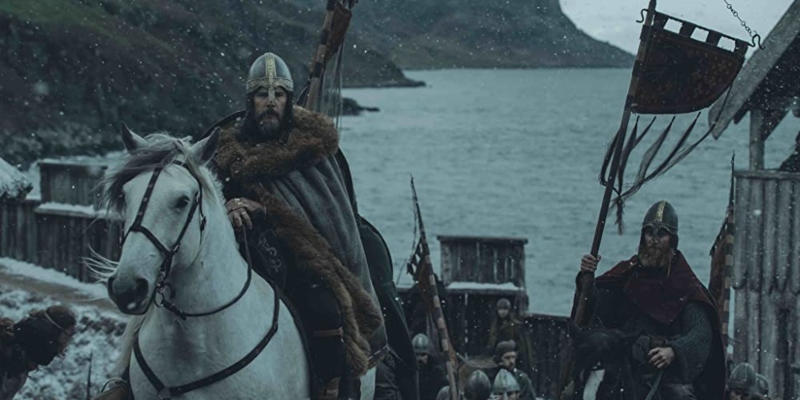You are using an out of date browser. It may not display this or other websites correctly.
You should upgrade or use an alternative browser.
You should upgrade or use an alternative browser.
Uncle Bill Shakespeare...Alive and Well!
- Thread starter Meanderer
- Start date
Meanderer
Supreme Member
Recently, on PBS...program of his first folio.Recently, on PBS...program of his first folio.
Hey, wait, Horatio didn’t die!
Meanderer
Supreme Member
Hamlet prevented Horatio from drinking what was left of the wine that Claudius poisoned, because Hamlet wanted Horatio to tell people his side of the story.Hey, wait, Horatio didn’t die!
Meanderer
Supreme Member
Ignore the doubters: here’s why Christopher Marlowe co-wrote Shakespeare’s Henry VI (2016)

"A new edition of Shakespeare’s works has identified Christopher Marlowe as a co-author. The editors of the New Oxford Shakespeare believe that Marlowe collaborated in Parts 1, 2 and 3 of Henry VI. The conclusion was reached on the advice of an “Attribution Board” of three specialists in the field of literary authorship." (READ MORE)
horseless carriage
Well-known Member
Shakespeare’s language has had such an impact on the English language that many phrases from his plays have become part of our common speech, whether we realise it or not.
Media headlines regularly feature Shakespeare quotes. Regular conversations include quotes from Shakespeare plays. In fact, Shakespeare is often quoted without the speaker even realising. In fact, The Oxford Dictionary of Quotations says that Shakespeare wrote about one-tenth of the most quotable quotations ever written or spoken in English.
Here is a list of just a few phrases that appear in Shakespeare’s plays and that are commonly spoken today:
Many of the Common Phrases in Shakespear's plays:
“I have been in such a pickle” - The Tempest
“I must be cruel, only to be kind” - Hamlet
“Laugh oneself into stitches” - Twelfth Night
"For goodness’ sake" - Henry VIII
"Neither here nor there" – Othello
“One fell swoop” - Macbeth
”The be-all and the end-all” - Macbeth
"Mum's the word" - Henry VI, Part II
“All that glisters is not gold” – The Merchant of Venice
"Eaten out of house and home" - Henry IV, Part II
"Knock knock! Who's there?" - Macbeth
"With bated breath" - The Merchant of Venice
“In my heart of hearts” - Hamlet
"Too much of a good thing" - As You Like It
“It’s Greek to me” – Julius Caesar
"A heart of gold" - Henry V
“Break the ice” – The Taming of the Shrew
"Such stuff as dreams are made on" - The Tempest
"Lie low" - Much Ado About Nothing
“I will wear my heart upon my sleeve” - Othello
“Made of sterner stuff” – Julius Caesar
"Dead as a doornail" - Henry VI, Part II
"Not slept one wink" - Cymbeline
"Foregone conclusion" - Othello
"The world's mine oyster" - The Merry Wives of Windsor
"Naked truth" - Love's Labour's Lost
"Faint-hearted" - Henry VI, Part I
"Send him packing" - Henry IV
"Melted into thin air" – The Tempest
"Own flesh and blood" - Hamlet
"Truth will out" - The Merchant of Venice
"Give the devil his due" - Henry IV, Part I
"Though this be madness, yet there is method in't" - Hamlet
"Salad days" - Antony and Cleopatra
"Spotless reputation" - Richard II
"Full circle" - King Lear
"All of a sudden" - The Taming of the Shrew
"Come what, come may" – Macbeth
“Neither rhyme nor reason” – The Comedy of Errors
Surprised? Don't be, there is so much more.
Meanderer
Supreme Member

"This book explores fashion during Shakespeare's era, a time when clothing conveyed much more than a personal statement, but was an absolutely accurate indicator of the social status of the wearer, as witnessed in so many Shakespeare plays when character dress, disguise or cross-dressing played pivotal roles in changing plots."
Meanderer
Supreme Member
KS3 Drama: Shakespearian characters' costumes
KS3 ShakespeareRosalind(500pix).jpg&f=1&nofb=1&ipt=9ccfe3bde8e710954e5bd3abfa163679711c7528ab59105ac0a78cdb9b17e1cf&ipo=images)
"As male actors played both sexes, costuming was particularly important to distinguish the male characters from the female characters."
"Robin Belfield of the Royal Shakespeare Company explains that it is up to you to decide how you want your character to look."
"He explains that Shakespeare plays can be set in any era; Juliet in ‘Romeo and Juliet’ could be played in traditional Elizabethan dress, in more modern dress or even in very casual clothing, depending on your vision for the part."
"He suggests that a well-chosen accessory or prop can help to define a character."
"He recommends using clues from the text to help define your vision for a character’s costume."
"Robin believes that costume design should involve using your imagination and creativity."
Last edited:
Meanderer
Supreme Member
Shakespeare on Eclipses
"In 1598, during Shakespeare’s lifetime, England experienced a total solar eclipse, with the path of totality tracking from Cornwall in the southwest up to Aberdeen in Scotland."
The physical darkness of an eclipse as a metaphor for psychological darkness:
“My wife, my wife! What wife? I have no wife.
O insupportable! O heavy hour!
Methinks it should be now a huge eclipse
Of sun and moon, and that th’ affrighted globe
Should yawn at alteration.”
—Othello in Othello (5.2.121)
"In 1598, during Shakespeare’s lifetime, England experienced a total solar eclipse, with the path of totality tracking from Cornwall in the southwest up to Aberdeen in Scotland."
The physical darkness of an eclipse as a metaphor for psychological darkness:
“My wife, my wife! What wife? I have no wife.
O insupportable! O heavy hour!
Methinks it should be now a huge eclipse
Of sun and moon, and that th’ affrighted globe
Should yawn at alteration.”
—Othello in Othello (5.2.121)
Meanderer
Supreme Member
A Shakespearean Study Guide for The Northman
Saxo and Shakespeare, Masculine Fantasies, and Racist Fictions in Robert Eggers’s New Blockbuster

"The Northman isn’t an adaptation of Hamlet."
"The film is an adaptation of one of Shakespeare’s sources, a story told in the medieval historian Saxo Grammaticus’s History of the Danes. The Northman overleaps Hamlet. It’s a 'Not Shakespeare' adaptation, to borrow the title of Christy Desmet, Natalie Loper, and Jim Casey’s recent book."
"Yet people today usually only know of Saxo because of Shakespeare. The Northman exploits the same Shakespearean text it avoids: the filmmakers are what Valerie Fazel and Louise Geddes call 'Shakespeare users'."
"Scholarly knowledge of Saxo, Shakespeare, Hamlet, and Shakespearean adaptation can clarify The Northman. And debates surrounding The Northman—such as the appropriation of Viking culture in modern white supremacist movements—can be read back into Saxo and Shakespeare."
"The five sections that follow address the history of Hamlet adaptation, the idea of “the north” in pre-modern Europe, the tradition of violent masculine vengeance, the feminist reading needed to recover authentic representation of women in this myth, and the white supremacist underpinnings of the film." (READ MORE)
Saxo and Shakespeare, Masculine Fantasies, and Racist Fictions in Robert Eggers’s New Blockbuster

"The Northman isn’t an adaptation of Hamlet."
"The film is an adaptation of one of Shakespeare’s sources, a story told in the medieval historian Saxo Grammaticus’s History of the Danes. The Northman overleaps Hamlet. It’s a 'Not Shakespeare' adaptation, to borrow the title of Christy Desmet, Natalie Loper, and Jim Casey’s recent book."
"Yet people today usually only know of Saxo because of Shakespeare. The Northman exploits the same Shakespearean text it avoids: the filmmakers are what Valerie Fazel and Louise Geddes call 'Shakespeare users'."
"Scholarly knowledge of Saxo, Shakespeare, Hamlet, and Shakespearean adaptation can clarify The Northman. And debates surrounding The Northman—such as the appropriation of Viking culture in modern white supremacist movements—can be read back into Saxo and Shakespeare."
"The five sections that follow address the history of Hamlet adaptation, the idea of “the north” in pre-modern Europe, the tradition of violent masculine vengeance, the feminist reading needed to recover authentic representation of women in this myth, and the white supremacist underpinnings of the film." (READ MORE)
Meanderer
Supreme Member
The Elephant In The Room: Ajax
elephant, noun.
1. b. fig. of a man of huge stature.
1609 Shakespeare Troilus and Cressida ii. iii. 2 Shall the Elephant Ajax carry it thus?
"The elephant; noble, beautiful, and calm, gracefully shuffling forwards on four tree-stump legs that crush anything that may so unfortunately find itself beneath them—bugs, small mammals, human toes. It’s a fate that can’t be avoided because, as we know, elephants can’t bend their knees."
"The elephant hath joints, but none for courtesy:
his legs are legs for necessity, not for flexure."
(2. 3. 98-99)
"That’s what we would have thought, had we lived in the 16th or 17th century. That’s what you may still think if you see an image of an elephant (pictured below, to refresh your memory), with column-like legs that don’t seem to move like ours. Have you ever seen an elephant cross their legs? The elephant’s hilariously inflexible legs coupled with its large stature proves to be an excellent insult to those around you who may not be the smallest and most delicate of companions."
"Shakespeare chose Ajax as his target – the dimwitted yet strong Greek commander of Troilus and Cressida. Taken straight out of Homer’s Iliad, where Ajax is described as having a large frame and being the strongest of the Achaeans, Shakespeare’s characterization is not necessarily wrong, although it isn’t the most humanizing."

elephant, noun.
1. b. fig. of a man of huge stature.
1609 Shakespeare Troilus and Cressida ii. iii. 2 Shall the Elephant Ajax carry it thus?
"The elephant; noble, beautiful, and calm, gracefully shuffling forwards on four tree-stump legs that crush anything that may so unfortunately find itself beneath them—bugs, small mammals, human toes. It’s a fate that can’t be avoided because, as we know, elephants can’t bend their knees."
"The elephant hath joints, but none for courtesy:
his legs are legs for necessity, not for flexure."
(2. 3. 98-99)
"That’s what we would have thought, had we lived in the 16th or 17th century. That’s what you may still think if you see an image of an elephant (pictured below, to refresh your memory), with column-like legs that don’t seem to move like ours. Have you ever seen an elephant cross their legs? The elephant’s hilariously inflexible legs coupled with its large stature proves to be an excellent insult to those around you who may not be the smallest and most delicate of companions."
"Shakespeare chose Ajax as his target – the dimwitted yet strong Greek commander of Troilus and Cressida. Taken straight out of Homer’s Iliad, where Ajax is described as having a large frame and being the strongest of the Achaeans, Shakespeare’s characterization is not necessarily wrong, although it isn’t the most humanizing."

Last edited:














